More info on Edison Chen scandals

This is not poo. Or is it Rainbow Brite's poo? Edison Chen, you sex maniac!
More info on Edison Chen scandals

This is not poo. Or is it Rainbow Brite's poo? Edison Chen, you sex maniac!
aka Chut doi seung giu
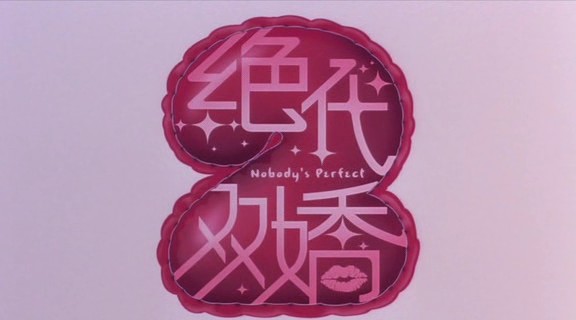
2008![]()
Directed by Patrick Kong Pak-Leung
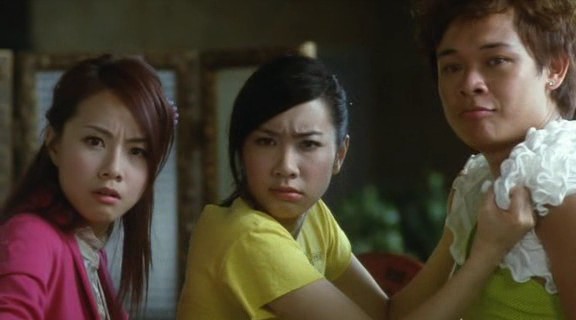
So not every film I watch is filled with girls dressed as cats, giant monsters, or a Turkish take of American culture. Sometimes I end up watching many things that are just regular films. And even though Nobody’s Perfect is from Hong Kong, it is a pretty straightforward comedy involving body switching and learning life lessons that could easily have been churned out of the US in the late 80s when body switching movies like Big, 18 Again, Vice Versa, and the like were all the rage. Oddly enough, the title screen and credits effects also looks like it was straight out of late 1980’s Hong Kong. Somebody needs to update their title graphics, because it stood out pretty remarkably compared to most other recent Hong Kong films I have seen.
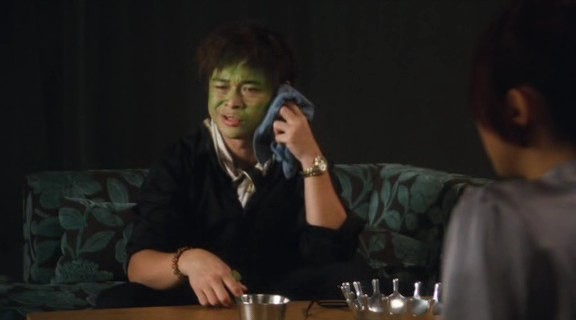
Stephy Tang and Kary Ng were both members of the Cookies, a 2002-era prefab Cantopop band that started out with nine girls, but was whittled downed to Kary Ng Ka-Wing, Miki Yeung, Theresa Fu Wing, and Stephy Tang and the group was renamed Mini-Cookies. Just watch out for the Mini-Cookie monster, as he will eat all your Cookies! Which one is more popular? Well, Kary Ng has huge images on Wikimedia Commons, while Stephy Tang only has very large images. Also Kary Ng has a cooler solo album cover, so Kary Ng wins.
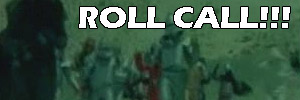
|
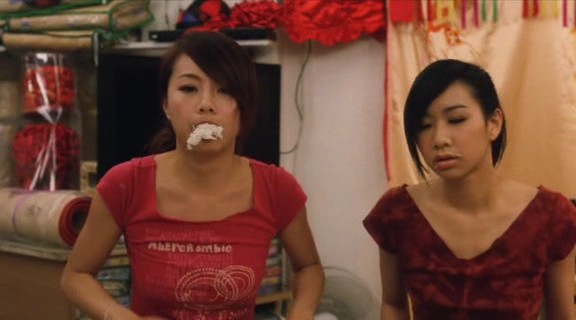
aka Zhui ying
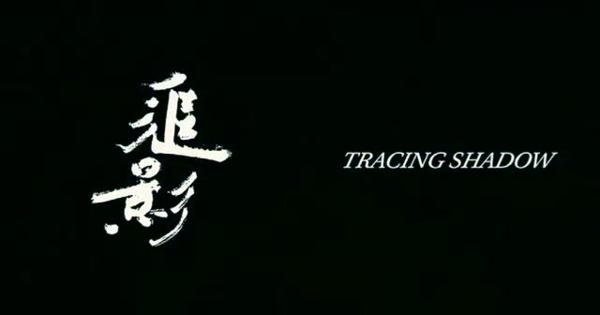
2009![]()
Directed by Marco Mak Chi-Sin and Francis Ng Chun-Yu
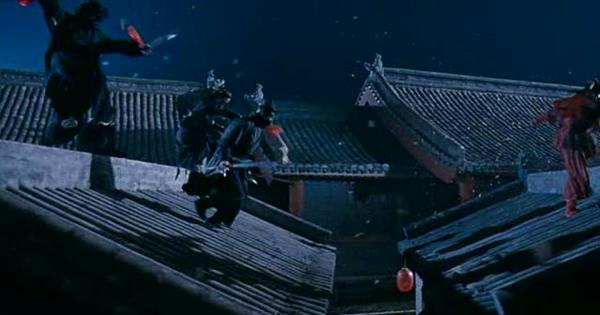
Tracing Shadow hit the scene when a trailer with cool shots floated around the net and got people all exited it was a cool martial arts action film. But it is not a drama, is an action comedy fantasy reportedly inspired by the classic King Hu film Dragon Inn. And it does have some gorgeous shots, but it suffers from some plot weakness.
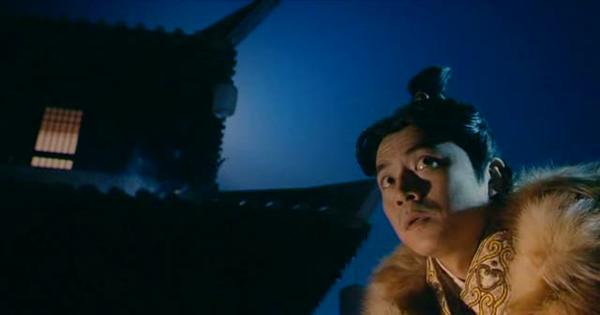
One thing Tracing Shadow does do that is unique is the use of look-alikes. Jackie Chan, Jet Li, and Andy Lau are all represented by not the actual performers, but by look-alikes. Eventually, more look-alikes show up, and we have a who’s who of Hong Kong celebrities running around, often in multiple instances. If this becomes more common, then we might have modern day versions of Brucespoiltation films! But, I would watch Clones of Jet Li, because, why the heck not? If it has dancing naked girls and bronzemen, all the better!
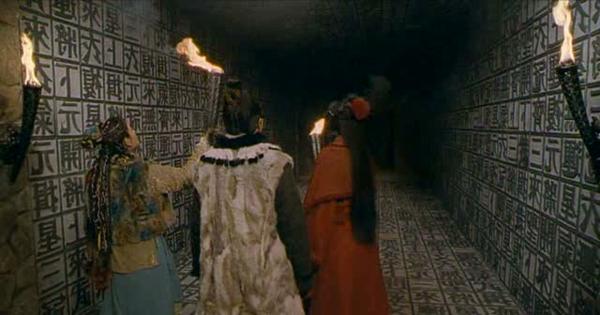
Let’s get on with the show….

|
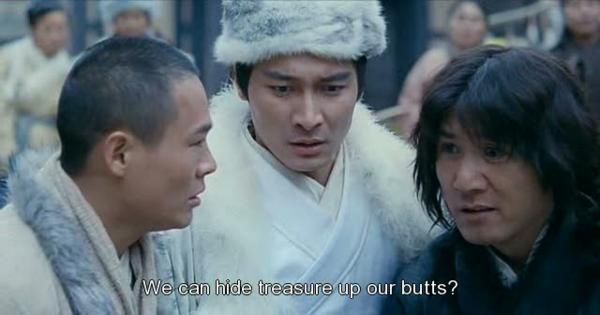
aka Kei hei hup aka Kung Fu Cyborg: Metallic Attraction

2009![]()
Directed by Jeffery Lau

Jeffery Lau declared he wanted to do Chinese Transformers, and have his robots be “the incarnation of Oriental wisdom and strength.” Okay. Lau is no stranger to science fiction, as anyone who has seen A Chinese Tall Story can testify. Kung Fu Cyborg was originally titled Robot, then the title was turned into the easier to remember Metallic Attraction: Kung Fu Cyborg. Except for when it was called Kung Fu Cyborg: Metallic Attraction! Or just Kung Fu Cyborg. D’Oh! So we’ll just call it Kung Fu Cyborg when we refer to it, even if we slip up later. Just ignore the slip ups. They are not the droids you are looking for.

But in any event, here are a bunch of cool posters for Kung Fu Cyborg.

This is a long movie, approaching Korean standard of length. One could easily trim 30 minutes and it would do nothing but help the film along. The length is because it seems like two movies smooshed together, an origin story and a second story. Unfortunately, that means things will be dragging. And dragging. And lots of side plots happen. And it takes forever for the freaking robots to do their robot thing. Which is sort of why I watched the movie in the first place. Before this introduction gets as long as the pre-robot fight scenes in Kung Fu Cyborg, let’s just get to the Roll Call!


|

aka Black Rose vs. Black Rose aka Hei mei gui yu hei mei gui aka 黑玫瑰與黑玫瑰

1966![]()
Directed by Chor Yuen
Written by Poon Faan

The sequel to 1965’s Black Rose has a greatly expanded scope, as the Chan sisters go from being champions of the poor to outright superheroes who take down a sinister secret gang intent on robbing jewelry from all over the city. The James Bond influence is very heavy, as there are a lot of gadgets, microbombs, disguises, and hidden identities. The film also has what sounds like an original score that is rather well done as well (and also Bond influenced).

The review of Black Rose has miniprofiles of Nam Hung, Connie Chan, Patrick Tse, and Chor Yuen, so we don’t have to do it here! Hooray for laziness! We also have the overviews of the Jane Bond genre and other interesting links there so we don’t have to link it again here. Spy With My Face is notable because this film was where Connie Chan eclipsed Nam Hung and became a bona fide Hong Kong superstar.

A color print does survive in the HKFA vault, but the VCD release is a black and white dub probably made for TV. This sucks, because it would be great to see all the funky colors. At this point in time Cantonese cinema was on the decline as the Shaw Brothers were becoming the standard with their high production values and massive use of color. Shaw was also putting out their own spy films at this time, some with female leads as well.
Once again we have no subtitles, but TarsTarkas.NET doesn’t need no stinking subtitles! And the wife translated about half of the film before deciding it was time for bed, so the rest I just followed along the story as best I could. It all works out fine.


|

aka Hei mei gui aka 黑玫瑰

1965![]()
Directed by Chor Yuen
Written by Hoh Bik-Gin

Welcome to a trip to some classic Cantonese cinema. Not only are we going to review Black Rose, but we’ll be hitting the sequel, The Spy With My Face, as well as one entry from the 1990’s, and an eventual rewrite of our review of Protege De La Rose Noire. Yes, that previous sentence will get edited as the other reviews appear here. Eventually. Maybe.
Black Rose was basically the beginning of the Jane Bond films. It did not start the strong female character/super hero genre, but popularized it to the point where Black Rose is known as the standard bearer of the genre. This blog entry going over some of the wonderful films featured on the SoftFilm blog features a cornucopia of films with strong female leads.
Connie Chan Po-Chu was born in 1947 and is the daughter of two Beijing opera stars (Chan Fei-nung and Kung Fan-hung) She was not only trained in classical opera style (specializing in male roles) but also trained in both Southern and Northern martial arts styles. Connie made her film debut in 1959’s The Scout Master, and became a breakout star in the 1960s. Her last film was 1972’s The Lizard (also her only film for Shaw Brothers and one of the few that still survives in color, The Spy With My Face was filmed in color even if it doesn’t seem to have survived that way.)

Unlike her fellow teen queen Josephine Siao, Connie Chan stepped out of the limelight after her retirement, though she does emerge from time to time in stage presentations on TV (much to the excitement of my in-laws, who spend a frightenly long time trying to capture just her performance from a TV special onto a DVDR despite barely knowing how to turn the computer on.) More information on Connie Chan can be found on Movie Fan Princess. The site is run by duriandave of SoftFilm, who also supplied me with the vcds used to review the two Black Rose films. Check her out in action in Lady Black Cat and The Furious Buddha’s Palm.

Nam Hung was born as Su Manmei. Her mother and sister were also stage actresses, but I don’t think they were in films. The stage name Nam Hung means “fame of the south”. She began stage performing in 1950 and moved to films in 1953. She set up the Rose Film Company in 1962 with future husband Chor Yuen (also the director of this film) She starred in many Chor Yuen and Chan Wan films, and was a coproducer of Black Rose and its sequel. She was also in the original House of 72 Tenants, which was remade and then both inspired Steve Chow’s Kung Fu Hustle. Nam Hung moved to tv in 1976.
Director Chor Yuen was born in 1934 as Cheung Bo-kin, the son of Cheung Wood-yau, a Cantonese cinema actor. After studying chemistry in college, Chor Yuen joined the cinema world, first as a screenwriter (under pen name Chun Yu) and then worked as assistant director to Chun Kim. His directorial debut was The Natural Son in 1959. He helmed all sorts of films over the years. Notable films include 1963’s Tear-laden Rose, 1968’s Winter Love, and 1968’s Young, Pregnant and Unmarried, a comedy capitalizing on the youth craze in Hong Kong (also starring Connie Chan). Chor Yuen joined Cathay in 1969 and started focusing on wuxia films. Then he moved to Shaw Brothers in 1971. Intimate Confessions of a Chinese Courtesan was one of his films there (he later remade it as Lust For Love Of A Chinese Courtesan) Besides the Rose Film Company with Nam Hung, Chor Yuen formed his own company Ligao Film in 1985

Patrick Tse Yin is probably best known to Western film fans as the evil guy in Shaolin Soccer, but he was a huge star in Cantonese film in the 1960s and is a pretty cool dude and leading man. But for people like me who were first exposed to him playing a jerk, we will always have that image stuck in the back of our minds when we see him play good guys. Patrick Tse Yin is the father of Nicholas Tse (seen here with his wife Cecilia Cheung in The Promise.)
The Black Rose series of films goes like so: The 1960’s had the first two entries, Black Rose and The Spy With My Face/Who is That Rose? in 1966. Then there was nothing until a revival in the 1990’s with homage films that are basically love stories to 1950s and 1960s Cantonese cinema. There are three films in this set, 1992’s 92 Legendary La Rose Noire (written and directed by Jeff Lau), 1993’s Rose, Rose, I Love You (directed by Jacky Pang and produced by Jeff Lau), and 1997’s Black Rose 2 (directed by Jeff Lau and Corey Yuen Kwai). The series was recently revived as a vehicle for the pop duo The Twins in 2004 for Protege de la Rose Noire. I doubt there will be any direct sequels to this due to the whole Edison Chen sex photo scandals which enveloped Twin Gillian Chung in its tentacles when she showed up naked online. Teresa Mo was the Black Rose in Protege, continuing the loose connections between the films (she was one of the apprentice Roses in 92 Legendary La Rose Noire.)
The VCDs we watched were without English subtitles, but we don’t need no stinking subtitles! And my lovely wife translated. So take that, not released on DVD film!
